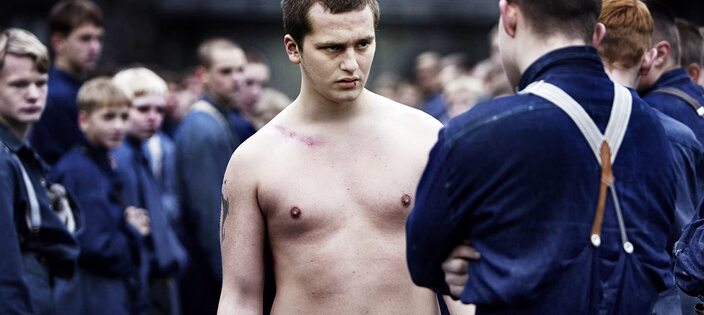KING OF DEVIL'S ISLAND
****
Director: Marius Holst
Screenwriters: Dennis Magnusson and Eric Schmid based on a story by Mette M. Bølstad and Lars Saabye Christensen
Principal cast:
Benjamin Helstad
Kristoffer Jones
Trond Nilssen
Morten Løvstad
Stellan Skarsgård
Magnus Langlete
Country: Norway/France
Classification: M
Runtime: 115 Mins.
Australian release date: 3 May 2012
When Marius Holst’s film King of Devil’s Island screened at the 2011 Rotterdam Film Festival, the public debate that followed forced a re-examination of its subject’s history: in 1915, Bastoy, a prison island located in the fjord of Oslo, housed a very dark secret. It was a place where young men were subjected to brutal discipline, coupled with arduous labour in conditions that were inhumane. Holst wanted to make the film after meeting a former inmate and, after hearing about what happened on the island, was determined to reveal to the world how ‘evil grows in institutions sealed off from the rest of the world’.
Identity was stripped from the inmates the moment they arrived at Bastoy and they were given a number to replace their names. A young man, Erling (Benjamin Helstad), was sent to the island for a crime that is not specifically identified. Being a headstrong lad, he managed to make an impression on the other inmates and set a path for rebellion against the repressive system that used and abused the young men both physically and emotionally.
His almost immediate attempt to escape put him in the frontline for disciplinary action from the formidable guard, Brathen (Kristoffer Joner), who had his own evil agenda. He was also subjected to the hard-line rules set by Governor Bestyreren (Stellan Skarsgård). The rigid rules were in place to exact conformity and rebellion was not to be tolerated. The brutal responses to Erling’s actions make for uneasy viewing and there are some pretty confronting scenes.
The performances are all excellent, as are the production values; John Andreas Andersen’s camerawork deservedly won the Best Cinematography Award at the Göteborg International Film Festival last year and the soundtrack is a treat, too. Collectively, these values make you feel as if you are on the island with the prisoners and hoping they manage to escape from their dire circumstances.
The end result is a drama which throws light on a subject that needed to be told and, in doing so, has probably made life a lot easier for those who are incarcerated on Bastoy to this day. Recent news reports state that it is now seen as a model prison which relies on ecological sustainability where the inmates work the farm and are able to participate in leisure activities during their time off. The end result is a system which has proven to lower the re-offending rates and a drop in the number of suicides and attempts to escape. It seems that out of a repressive system the Norwegians have learnt to adapt the process of rehabilitation. That can only be a positive thing.
